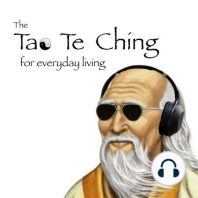29 min listen

Tao Te Ching Verse 26: Practicing Grounded Stillness
Tao Te Ching Verse 26: Practicing Grounded Stillness
ratings:
Length:
36 minutes
Released:
Mar 20, 2020
Format:
Podcast episode
Description
Tao Te Ching Verse 26:translated by James LeggeGravity is the root of lightness; stillness, the ruler of movement.Therefore a wise prince, marching the whole day, does not go far from his baggage waggons. Although he may have brilliant prospects to look at, he quietly remains (in his proper place), indifferent to them. How should the lord of a myriad chariots carry himself lightly before the kingdom? If he does act lightly, he has lost his root (of gravity); if he proceeds to active movement, he will lose his throne.Photo by dorota dylka on UnsplashMasters of the light and restlessnessJames Legge translates: Gravity is the root of lightness; stillness, the ruler of movement. Employing a bit of Dualistic clarity here, we’re reading the principles of staying centered, I think. If we look at lightness, we can read this as frivolity - sort of a sense of irresponsible slipshodness, if you like. And gravity - looking at it through a physics lense, gravity is that which attracts other things to it - I’m talking from the point of view of space, not the ground - there is a body of mass that is denser than what is around it. I’m picturing the earth with a specific amount of mass that attracts other things to it in space. There is this idea of density there.So let’s imagine that our centeredness is our gravity. The denser our center is, the more contrast we can apply to things we do that satisfy our corporeal senses. So for example, Let’s compare my sense of centeredness and how that feels with being on stage in front of an audience. When in front of a lot of people, there is this opposite feeling of centeredness there. When I’m centered, I feel solid, whole. When I’m not, I feel kind of ‘out there’ and I’m paying attention to things external to me. And this can be applied to any other concept that involves feeling centered and paying attention to external things - so I think that’s the meaning of the whole, Gravity-is-the-root-of-lightness thing. The idea that it all starts with my center, and the center is the place from which everything else originates.Ok, looking at the next idea: Stillness is the ruler of movement. This one seems a little easier to understand, now - movement, the Yang, originates from stillness, the Yin. Sort of like a tree - it’s roots are still and fast in the earth, while its branches and leaves are tied to nothing and are subject to the wind, moving around according to the direction and velocity of it. There is no movement without stillness - kind of like how we talked about the sounds underneath the sounds before - stillness is the non-movement underneath the movement.So putting these two ideas together gives me context for the principle that Lao Tzu is discussing in this verse. Grounded, or Rooted Stillness, are the places from which I begin. Light movement, or aimless frivolity, are the places in which I find myself if I allow external things to capture and hold my attention.
Released:
Mar 20, 2020
Format:
Podcast episode
Titles in the series (80)
Tao Te Ching Verse 9: Allowing Perfection by The Tao Te Ching for Everyday Living